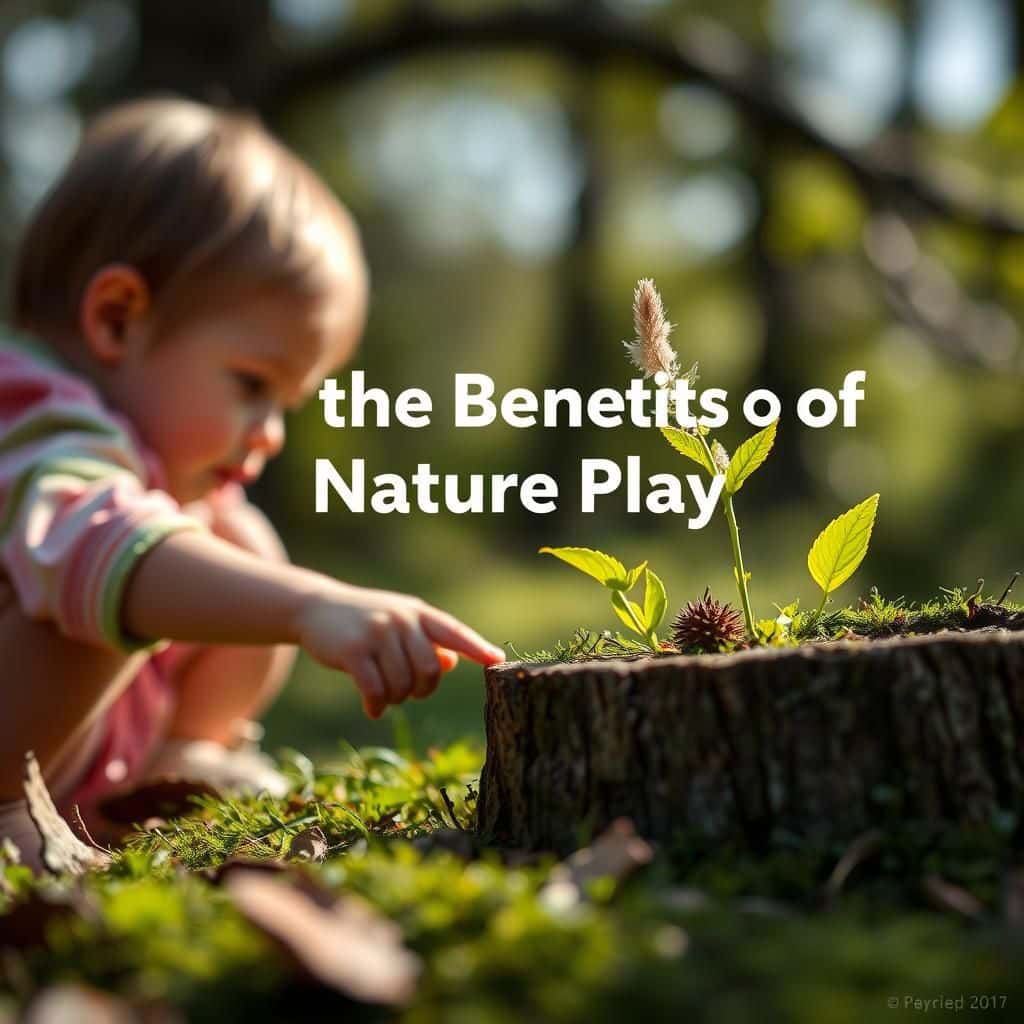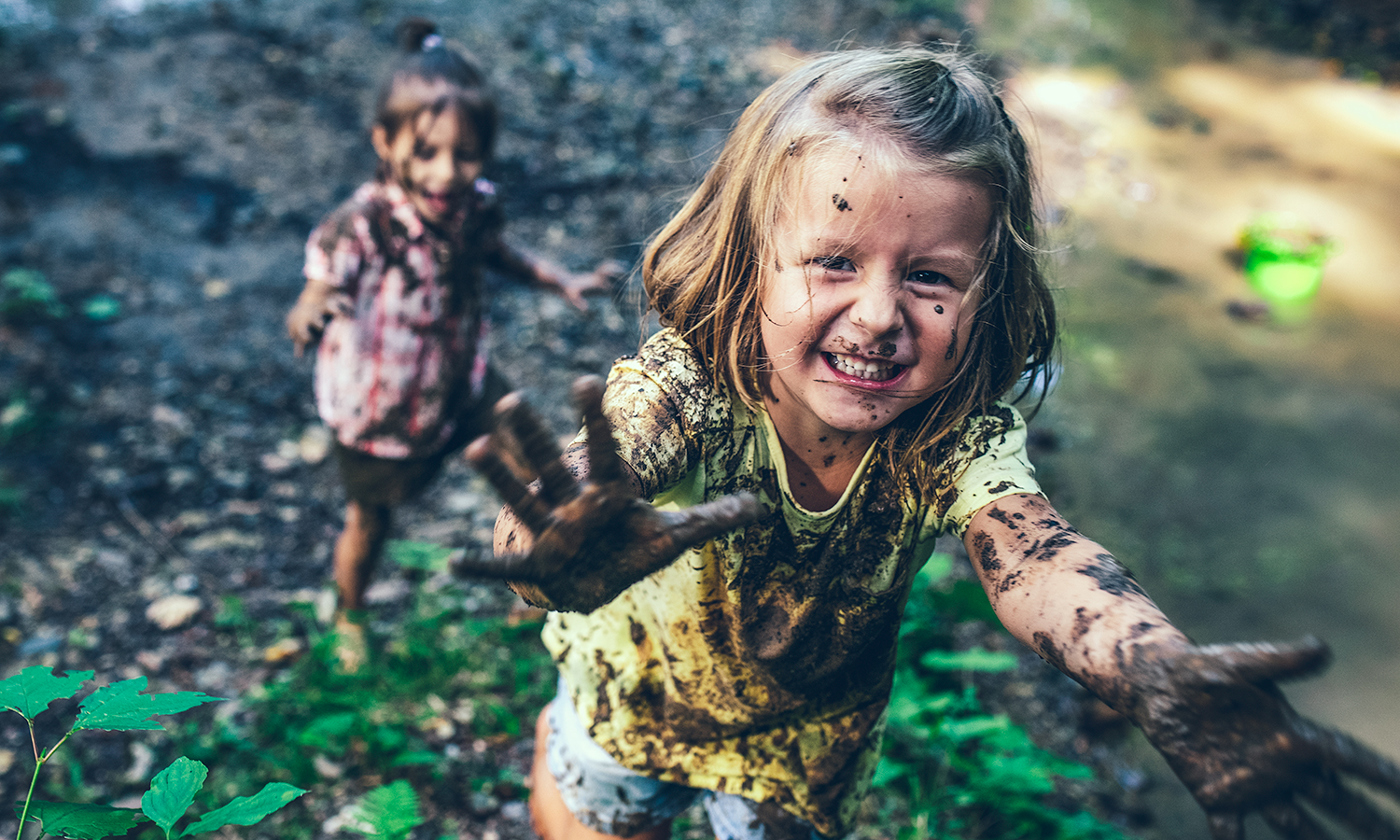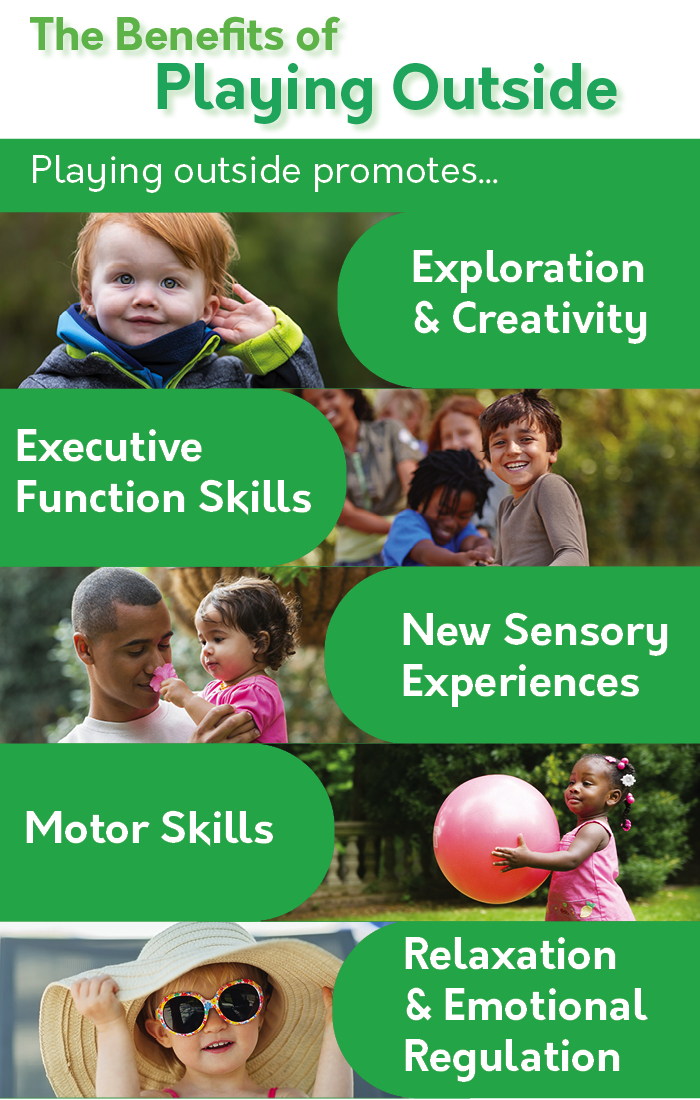Exploring the Benefits of Nature Play in Early Childhood: A Guide for Parents and Educators

Nature play is an essential aspect of childhood development that fosters creativity, resilience, and social skills. As children engage with the natural environment, they benefit from unstructured, open-ended experiences that stimulate their imaginations and promote physical activity. This guide aims to explore the myriad benefits of nature play in early childhood, providing parents and educators with practical tips and insights to encourage outdoor exploration. By understanding the significance of connecting with nature, caregivers can cultivate a love for the outdoors in young children, laying a foundation for holistic well-being and lifelong learning.
- The Importance of Nature Play in Early Childhood
- The Developmental Benefits of Nature Play
- Research has shown that spending time in natural settings can have profound effects on children's mental health. Nature play contributes to reduced levels of stress, anxiety, and depression, while simultaneously promoting mood enhancement and emotional resilience. The serenity of natural environments fosters mindfulness, encouraging children to be present and attentive to their experiences. Furthermore, interacting with diverse flora and fauna can also instill a sense of wonder and appreciation for the world around them, nurturing a positive self-image and overall well-being.
- Integrating nature play into daily routines can be achieved through a variety of simple strategies. Parents and educators can allocate specific times for outdoor activities, such as nature walks, gardening, or free play in parks. Field trips can also be organized to local natural areas, enhancing children’s appreciation for the environment. Furthermore, facilitating activities that involve sensory experiences - such as collecting leaves, observing wildlife, or playing in dirt - makes nature play more accessible and enjoyable for children. These experiences can be incorporated into educational lessons, reinforcing concepts taught in the classroom through real-life encounters.
- What is nature play in early childhood?
- What were the benefits of children playing in nature?
- What are the benefits of nature sensory play?
- How does nature play a role in development?
- Questions from Our Readers
The Importance of Nature Play in Early Childhood
Nature play is a vital component of early childhood development, as it offers children the opportunity to engage with the world around them in a hands-on manner. Through playing outdoors, children not only foster their creativity and imagination but also enhance their physical skills and build resilience. Interactions with natural environments stimulate curiosity and promote problem-solving abilities, enabling children to explore their surroundings and learn about ecosystems and biodiversity. Furthermore, nature play encourages social interactions with peers, helping to develop communication skills and emotional intelligence. In essence, integrating nature play into early childhood education is essential for nurturing holistic development and fostering a deep connection with the environment.
The Developmental Benefits of Nature Play
Participating in nature play supports children's cognitive, social, emotional, and physical development. Engaging with natural elements allows children to explore concepts such as balance, cause and effect, and spatial awareness. Moreover, when children play together in nature, they learn to cooperate, negotiate roles, and communicate effectively with one another. The unstructured nature of outdoor play promotes independent thinking and decision-making, which are crucial skills for lifelong learning. The benefits of nature play are vast, as it plays a significant role in developing a well-rounded individual.
Research has shown that spending time in natural settings can have profound effects on children's mental health. Nature play contributes to reduced levels of stress, anxiety, and depression, while simultaneously promoting mood enhancement and emotional resilience. The serenity of natural environments fosters mindfulness, encouraging children to be present and attentive to their experiences. Furthermore, interacting with diverse flora and fauna can also instill a sense of wonder and appreciation for the world around them, nurturing a positive self-image and overall well-being.
While there are countless benefits to nature play, safety remains a paramount concern for caregivers and educators. Outdoor play environments need to be assessed for potential hazards, ensuring that they are age-appropriate and conducive to safe exploration. Strategies such as supervision, establishing clear boundaries, and teaching children about risks can mitigate dangers associated with outdoor play. It is essential to strike a balance between encouraging adventurous activities and maintaining a safe environment, allowing children to engage in the exploration of nature while minimizing risks.
Integrating nature play into daily routines can be achieved through a variety of simple strategies. Parents and educators can allocate specific times for outdoor activities, such as nature walks, gardening, or free play in parks. Field trips can also be organized to local natural areas, enhancing children’s appreciation for the environment. Furthermore, facilitating activities that involve sensory experiences - such as collecting leaves, observing wildlife, or playing in dirt - makes nature play more accessible and enjoyable for children. These experiences can be incorporated into educational lessons, reinforcing concepts taught in the classroom through real-life encounters.
Educators and caregivers play a crucial role in facilitating nature play for children. They can create an environment that encourages exploration by providing resources such as tools, art materials, and safe access to natural areas. It is essential for adults to model positive interactions with the environment, demonstrating respect for nature and encouraging children's curiosity. By asking open-ended questions and engaging in discussions about their discoveries, caregivers can foster a love for nature and enhance children's learning experiences. Thus, educators become vital partners in cultivating children's connection to the natural world.
| Benefit | Description |
|---|---|
| Cognitive Development | Enhances problem-solving and critical thinking skills |
| Emotional Well-being | Reduces stress and promotes positive mood |
| Social Skills | Encourages communication and cooperation among peers |
| Physical Development | Improves motor skills and overall fitness |
| Environmental Awareness | Fosters appreciation and respect for nature |
What is nature play in early childhood?

Nature play in early childhood refers to activities that allow young children to engage with and explore the natural environment. This type of play encourages curiosity, creativity, and imagination, as children interact with elements such as trees, water, soil, and wildlife. Through nature play, children not only learn about their surroundings but also develop essential life skills and foster a deeper connection to the environment. The benefits of nature play extend beyond physical activities; it promotes social interaction, problem-solving abilities, and overall cognitive development.
Benefits of Nature Play
Nature play offers numerous advantages for young children, which can be categorized as follows:
- Physical Development: Engaging in nature play helps improve motor skills, coordination, and overall fitness through activities like climbing, running, and balancing.
- Cognitive Growth: Children develop critical thinking and problem-solving skills as they navigate their surroundings and encounter various challenges in the natural world.
- Emotional Well-being: Nature play provides a calming and restorative environment, reducing stress and anxiety while promoting emotional resilience.
Types of Nature Play Activities
Nature play encompasses a wide range of activities that children can engage in outdoors. Common types include:
- Exploratory Play: Children can explore different terrains, such as parks, forests, or beaches, discovering wildlife and various natural features.
- Creative Play: Activities such as building forts, creating art from natural materials, or engaging in imaginative games using elements from nature.
- Free Play: Allowing children the freedom to choose their activities fosters independence and self-directed learning in an organic setting.
Role of Adults in Nature Play
While children play a central role in nature play, adults also have a significant part to play, including:
- Facilitating Opportunities: Adults can create safe and stimulating environments by providing access to natural spaces and materials that encourage exploration.
- Encouraging Interaction: Adults can guide children to engage with their surroundings and facilitate group play, promoting social skills and collaboration.
- Modeling Behavior: By participating in nature play themselves, adults can inspire children to connect with nature and to appreciate the environment.
Challenges of Implementing Nature Play
Despite its benefits, there are challenges in facilitating nature play, which include:
See also:
- Safety Concerns: Ensuring that children play in safe environments while still allowing them to take reasonable risks can be a delicate balance for caregivers.
- Access to Natural Spaces: Urbanization and limited access to green spaces can hinder opportunities for nature play in some communities.
- Parental Attitudes: Some parents may be hesitant to allow their children to play outdoors due to concerns about dirt, insects, or potential injuries.
Linking Nature Play to Learning Standards
Nature play can be linked to various educational frameworks and learning standards through its integral role in child development:
- STEM Learning: Nature play can foster interest in science, technology, engineering, and mathematics through hands-on observations and experiments with natural phenomena.
- Literacy Skills: Observing and interacting with nature can enhance vocabulary and language skills as children describe their experiences and share stories.
- Social Studies: Nature play can help children understand their environment, ecosystems, and the importance of conservation, linking to broader themes in social studies and environmental education.
What were the benefits of children playing in nature?

The benefits of children playing in nature are numerous and can positively impact their physical, emotional, and cognitive development. Engaging with natural environments fosters various essential skills and promotes overall well-being. Here are some of the key advantages of children's interaction with nature:
Physical Health and Activity
Playing in nature promotes physical health through increased activity levels. Unlike indoor play, which often consists of sedentary activities, outdoor play encourages children to engage in various forms of movement.
- Improved Coordination: Natural environments provide unique challenges that enhance motor skills and coordination.
- Increased Fitness: Activities like running, climbing, and playing games in natural settings contribute to better overall fitness.
- Vitamin D Exposure: Outdoor play ensures children receive sufficient sunlight, which is crucial for bone health and immune function.
Enhanced Cognitive Skills
Nature provides a rich sensory environment that stimulates children's cognitive development. When children play outside, they encounter new challenges that enhance critical thinking and problem-solving abilities.
- Exploration and Discovery: Children learn through exploration, sparking curiosity and a desire to understand their surroundings.
- Creativity and Imagination: Natural settings stimulate creative thinking by allowing children to invent games and challenge themselves.
- Concentration and Focus: Interacting with the varied stimuli of nature can improve attention spans and focus.
Emotional Benefits and Well-being
Playing in natural environments has profound effects on a child's emotional health. Nature can act as a natural stress reliever, promoting feelings of happiness and relaxation.
- Reduced Stress Levels: Nature helps lower cortisol levels, which can alleviate anxiety and stress in children.
- Boosted Mood and Happiness: Exposure to natural light and fresh air contributes to overall well-being and a positive mood.
- Enhanced Self-esteem: Accomplishing physical tasks in natural settings can lead to increased confidence and self-worth.
Playing outdoors in nature enhances social interactions among children, as it often involves group play and collaboration. Natural environments encourage children to work together and communicate effectively.
- Teamwork and Collaboration: Group activities in nature foster cooperation and shared goals among peers.
- Conflict Resolution: Outdoor play provides opportunities for children to navigate conflicts and develop negotiation skills.
- Building Friendships: Engaging in shared outdoor experiences can strengthen social bonds and promote lasting friendships.
Connection to the Environment
Playing in nature helps children develop a strong connection to the environment, fostering a sense of stewardship and responsibility towards nature and ecological conservation.
- Awareness of Nature: Regular interaction with natural environments cultivates appreciation and respect for wildlife and ecosystems.
- Understanding Ecosystems: Children learn about interdependence and the role of different species in their habitats through hands-on experiences.
- Encouragement of Sustainable Practices: Early experiences in nature can motivate children to adopt environmentally-friendly habits as they grow.
What are the benefits of nature sensory play?

The benefits of nature sensory play are numerous and contribute significantly to the overall development of children. Engaging with the natural environment through sensory experiences helps children enhance their cognitive, emotional, and physical growth. Here are some key benefits explained in detail.
Enhances Cognitive Skills
Nature sensory play stimulates cognitive development by exposing children to various sights, sounds, textures, and smells found in natural environments. This immersion enhances critical thinking and problem-solving skills as children explore and interact with different elements of nature.
- Observation Skills: Children learn to observe changes in their environment, fostering curiosity.
- Exploration: Engaging in sensory play encourages children to explore and expand their understandings.
- Language Development: Describing their experiences helps enhance vocabulary and communication skills.
Promotes Emotional Wellbeing
Connecting with nature has proven to be beneficial for emotional health. Sensory play allows children to express their feelings and reduces stress levels, promoting a sense of peace and well-being.
- Stress Relief: Nature's calming effects help reduce anxiety and promote relaxation.
- Emotional Expression: Sensory experiences offer children an outlet to express their emotions effectively.
- Confidence Building: Successfully navigating sensory play activities enhances self-esteem.
Improves Physical Development
Engaging with natural elements through sensory play can significantly boost physical skills. Activities such as climbing, running, or digging help children develop both fine and gross motor skills.
See also:
- Gross Motor Skills: Activities in nature often involve running, jumping, or climbing, which strengthen large muscle groups.
- Fine Motor Skills: Handling small natural objects improves coordination and dexterity.
- Sensory Integration: Natural play helps children integrate sensory information, crucial for physical coordination.
Nature sensory play provides opportunities for social development. When children engage in group activities, they learn to communicate and collaborate with peers, enhancing their social skills.
- Teamwork: Playing together in nature fosters a sense of teamwork and collaboration.
- Conflict Resolution: Social interactions in play scenarios teach children how to negotiate and resolve conflicts.
- Empathy: Sharing experiences in nature encourages understanding and empathy towards peers.
Fosters a Love for Nature
Regular engagement in nature through sensory play cultivates a lasting appreciation for the environment. Children learn to value their surroundings and develop a sense of responsibility toward nature.
- Environmental Awareness: Experiencing nature firsthand helps children develop an understanding of ecosystems.
- Sustainable Practices: Engaging with nature builds awareness of conservation and sustainability.
- Connection to Nature: Children develop a personal connection with the environment, encouraging outdoor activities throughout life.
How does nature play a role in development?

Nature plays a significant role in human and ecological development, influencing various aspects of growth, sustainability, and overall well-being. Through its multifaceted interactions with both organisms and environments, nature impacts physical, emotional, and social development. Here are key areas where nature's influence is profound:
The Importance of Biodiversity
Biodiversity refers to the variety of life on Earth, encompassing different species, genetic variations, and ecosystems. Its significance in development is profound as it supports ecological balance.
- Ecological Stability: High levels of biodiversity contribute to ecosystem stability and resilience, allowing environments to recover from disturbances.
- Resource Availability: Diverse ecosystems provide essential resources, such as food, medicinal compounds, and raw materials for various industries.
- Pollination Services: Many crops depend on biodiverse pollinator species, highlighting the critical role of nature in agricultural development.
Nature as a Catalyst for Physical Health
Exposure to natural environments positively influences physical health. Access to nature can enhance fitness levels and reduce health risks.
- Exercise Opportunities: Natural spaces encourage outdoor activities like hiking, jogging, and biking, promoting a physically active lifestyle.
- Stress Reduction: Studies show that spending time in nature lowers cortisol levels, thus reducing stress and enhancing overall health.
- Improved Air Quality: Vegetation plays a crucial role in filtering pollutants, contributing to better air quality and respiratory health.
Nature fosters social connections and communal relationships, essential for human development. Engaging with nature can build social capital and community ties.
- Community Engagement: Natural spaces often serve as gathering places, encouraging interaction and collaboration among community members.
- Shared Experiences: Activities like gardening or conservation projects create shared goals and experiences, enhancing social bonds.
- Cultural Identity: Many communities derive cultural significance from natural landscapes, shaping identities and promoting a sense of belonging.
Cognitive Development through Natural Interaction
Nature also plays a crucial role in cognitive development, particularly in children. Interacting with natural environments enhances mental growth and creativity.
- Enhanced Learning: Studies indicate that children who learn in outdoor environments show improved focus and cognitive skills.
- Creativity Boost: Natural settings stimulate curiosity, encouraging inventive thinking and problem-solving abilities.
- Reducing Attention Fatigue: Exposure to nature helps restore attention, allowing children to grasp concepts more efficiently after breaks outdoors.
The Economic Aspects of Nature in Development
Nature contributes significantly to economic development through various sectors, including tourism, agriculture, and sustainable resource management.
- Tourism Revenues: Natural landscapes attract tourists, creating jobs and generating income for local economies.
- Sustainable Practices: Developing sustainable natural resource management strategies can enhance economic stability and environmental protection.
- Agricultural Productivity: Healthy ecosystems support agriculture through services such as nutrient cycling and pest control, directly impacting food security.
Questions from Our Readers
What is nature play?
Nature play refers to unstructured outdoor play that encourages children to interact with their natural environment. This type of play promotes exploration, imagination, and creativity while allowing children to experience the diverse elements of nature, such as plants, animals, and weather.
What are the benefits of nature play in early childhood?
The benefits of nature play in early childhood are numerous, including improved physical health, enhanced social skills, and increased cognitive development. Engaging with nature helps children build resilience, fosters a sense of wonder, and encourages problem-solving skills as they navigate natural environments.
How can parents encourage nature play?
Parents can encourage nature play by providing opportunities for outdoor exploration, such as visiting parks, gardens, or natural reserves. Additionally, allowing children to engage in free play and exploration without structured activities can help them develop a deeper connection with the environment and enhance their curiosity and creativity.
Is nature play safe for young children?
While some parents may have concerns about safety, nature play can be made safe by supervising children and setting appropriate boundaries. Ensuring children wear suitable clothing and understanding their limits is essential. Ultimately, nature play is a valuable experience that helps children learn risk assessment and develop confidence in a controlled environment.
See also:

If you want to read more articles like Exploring the Benefits of Nature Play in Early Childhood: A Guide for Parents and Educators, we recommend you check out our Landscaping category.
Leave a Reply
Related Articles